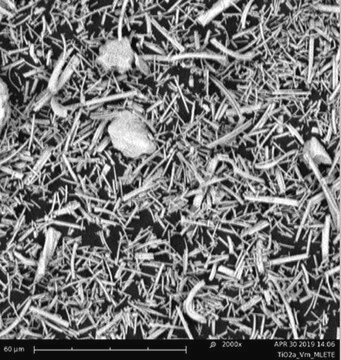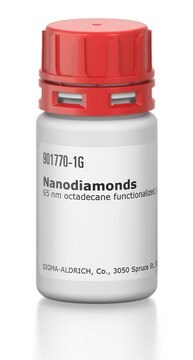774510
Titanium(IV) oxide
nanowires, diam. × L ~100 nm × 10 μm
Synonym(s):
Titania nanofibers, Titania nanowires, Titanium dioxide nanofibers, Titanium dioxide nanowires, Titanium(IV) oxide nanofibers, Titania, Titanium dioxide
About This Item
Recommended Products
form
nanowires
Quality Level
diam. × L
~100 nm × 10 μm
mp
>350 °C (lit.)
density
4.26 g/mL at 25 °C (lit.)
SMILES string
O=[Ti]=O
InChI
1S/2O.Ti
InChI key
GWEVSGVZZGPLCZ-UHFFFAOYSA-N
Looking for similar products? Visit Product Comparison Guide
Application
Preparation Note
Storage Class Code
13 - Non Combustible Solids
WGK
nwg
Flash Point(F)
Not applicable
Flash Point(C)
Not applicable
Choose from one of the most recent versions:
Already Own This Product?
Find documentation for the products that you have recently purchased in the Document Library.
Customers Also Viewed
Articles
In many technologies, performance requirements drive device dimensions below the scale of electron mean free paths (λe). This trend has increased scientific interest and technological importance of electrical resistivities at the nanoscale.
Electronically, it behaves as a wide band gap (3.2 eV) semiconductor and exhibits memristor properties.2 Optically, TiO2 has high opacity with a very high refractive index3 (>2.4), and it exhibits strong absorbance in the UV range.
Among various ceramics, one-dimensional (1-D) piezoelectric ceramics have attracted significant scientific attention for use in energy harvesting.
The production of hydrogen by catalytic water splitting is important for a wide range of industries including renewable energy petroleum refining and for the production of methanol and ammonia in the chemical industry.
Our team of scientists has experience in all areas of research including Life Science, Material Science, Chemical Synthesis, Chromatography, Analytical and many others.
Contact Technical Service





